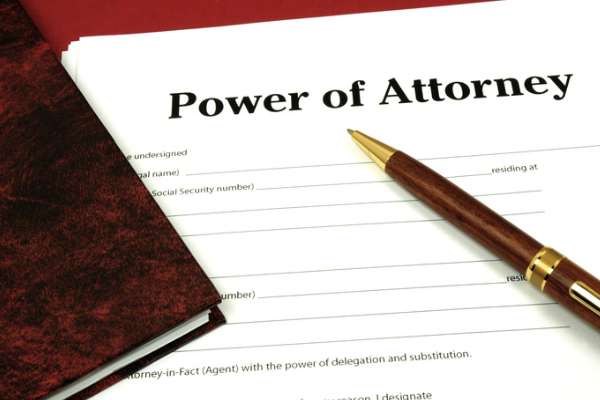Grant a general power of Attorney to someone is to give control over their property. If you, for whatever reason, are unable to manage their own assets, it would grant a general power of attorney to a responsible entity. However, if you become incapacitated mentally or physically, his general power would be revoked; to prevent this from happening, it would give you a durable general power. If it does not give to general anyone, then your spouse or relatives will have to go to court after his incapacity to take responsibility for their goods. It is extremely important to establish a long-lasting power if there is a chance that health problems would make him unable to control their financial affairs in the near future.
There are two ways that can give a lasting power: conditioned or unconditioned. The General powers conditioned only take effect when you are unable to manage their own assets. Not conditioned General powers take effect even before the it is incapacitated mentally or physically.
Yet, despite the way in which they are awarded, the General powers granted end at the time of his death. Durable General powers are used only to deal with financial planning and management of your assets while you are alive. If you want to give to someone who distributes your assets after your death, you have to assign that person as the executor of his will; see here for details on how to make a will.
Questions & answers on the General power:
What is a General power of Attorney?
A general power of Attorney is a legal docomento which is used to delegate the legal authority of a person to another. The person that firm (running) a general power of Attorney is called the principal (in English, the “main”). The general power of Attorney gives legal authority to another person (called the agent or, in English, “Attorney-in-fact”) to make decisions regarding goods, finance, and legal affairs by the mandator.
An agent, a principal can give a broad legal authority, or a very limited authority. The general power of Attorney is often used to help in the event of illness or incapacitation of the mandator, or in legal transactions when the principal can not submit to sign the necessary legal documents.
Are there different types of general power of Attorney and a Will Writers?
Yes. There is the “non-durable” power of Attorney, “lasting” and “conditioned. The “non-durable” power of Attorney takes effect immediately. It continues until it is revoked by the principal, or until the principal becomes mentally incompetent or die.
A “non-durable” power of Attorney is frequently used for a transaction specific, such as the closing of a sale of a residence, or the management of the financial affairs of the client as the client travels outside the country.
A “durable” power of Attorney allows the agent acting by the principal, even after the client is not mentally competent or physically capable of taking decisions. The “durable” power of attorney can be used immediately, and remains in force until it is revoked by the principal, or until the principal becomes mentally incompetent or fallesca.
A conditional power of Attorney takes effect at a point in the future. I.e., it depends on a “condition” that is a specific event that general power singles. This event is often disease or fallesen of the mandator.
The general power of Attorney “conditioned” often will have the principal physician to determine whether the principal is able to handle his financial affairs. A conditional power of Attorney remains in force until the death of the mandator, or until it is revoked by the Court.
When is it appropriate to use a general “conditioned” or “durable” power with Probate?
The general power of Attorney “conditioned” and the “durable” power of attorney are frequently used to make plans with respect to the incapacitation and loss of future mental ability of the mandator arising from, for example, Alzheimer’s disease or a catastrophic accident. That’s why it is very important to use solicitors that specialise in Will Writing, Probate and Lasting Power of Attorney UK.
To nominate an agent under a general power of Attorney “lasting” or “conditional”, the principal is establishing a procedure for the management of their financial affairs in the event of incapacity or incompetence.
A “non-durable” power of Attorney allows a client decide in advance who will make important decisions about their financial matters and business in the future.
It also helps to avoid the legal costs to appoint an agent to handle the Affairs of the principal in the case of their incapacitation or loss of mental ability.
What kinds of legal authority can be granted under a general power of attorney and a last will and testament?
Whether it is “not sustainable,” “long-lasting”, or “conditioned,” a general power of attorney can be used to grant an agent any or all of the following legal powers:
- Buy sell your real estate
- Manage your assets
- Manage your banking transactions
- Invest or not invest your money
- Make legal claims and engage in legal proceedings
- Responsible for tax and retirement issues
- Make part of you gifts
How do I choose an agent to make a general power of Attorney?
You should choose a trusted family member, a friend, or a professional with a reputation of outstanding honesty. Remember, signing a power of Attorney that gives wide authority to an agent is like signing a blank cheque.
By the way, never should be a general power to anyone that you do not rely completely. And do not allow that nobody force you to sign a general power of attorney.
Can I name more than one agent in a power of Attorney?
Yes. You may appoint multiple agents. If you appoint two agents or more, must decide if they are required to act together to make decisions regarding their affairs, or if everyone can act separately.
Both ways have their advantages and disadvantages. Require that its agents acting together can protect the wisdom of their decisions. On the other hand, require the agreement of all of its agents may have as a result delay or inaction in the case of a disagreement between them, or the unavailability of one of them to sign legal documents.
Allow your agents to act separately can ensure that an agent is always available to act on their behalf. But it can be the result of creating confusion and disagreement if the agents do not communicate with the other, or if one of them believes that the other does not act in their best interest.
The effectiveness of the General powers depends on the quality of the appointed agents. Appoint a reliable person as agent is essential. Without a reliable agent, a general power of attorney becomes a dangerous legal instrument, and a threat to the best interests of the principal.
Do after signing a power general, can I continue taking legal and financial decisions for me own?
Yes. The agent that is named in a general power of Attorney is your representative, not his “boss.”As long as you have the legal capacity to make decisions, you can send your agent do only the things that wants you to do.
What are the duties of an agent toward a main principal?
Agent is obligated you act in the best interests of the mandator, and prevent the auto-contratacion, i.e., promoting the interests of the agent rather than the best interest of the principal.
An agent that is named in a general power of Attorney is a fiduciary, which must observe strict standards of honesty, loyalty, and honesty with regard to the principal. An agent must safeguard the assets of the mandator, keep them separated from the personal assets of the agent. The money must be kept in a bank account separately for the benefit of the mandator. Agents must also keep accurate financial records about their activities, and provide a complete and regular accounting of all the money and goods that have in their possession.
Make it clear to his agent you want accurate records of all transactions carried out by you, and which provide an accounting on a regular basis. You can also indicate your agent to provide you an accounting to a third party – a member family or friend trust – where you yourself can not review the accounting.
Is it possible for an agent to steal me my money and my goods?
Yes. A general power of attorney can be abused, and dishonest agents have used general powers of attorney to transfer the assets of the principal to themselves and others. Why it is so important to appoint an agent that is fully reliable, and require that the agent provides an accounting complete and regular to you or a third party.
Can the transfer of the assets of a principal be a good thing?
Yes. A buyer may want to authorize transfers or gifts of property for estate-planning purposes or other purposes.
Who watches the actions of my agent?
There is no official or governmental entity who supervise agents who act in accordance with a general power of attorney. That is up to the President. For this reason, it is important to insist on your agent to keep accurate records of all transactions made by you, and provide you with an accounting on a regular basis. You can also direct you to your agent provide an accounting to a third party when you yourself can not review the accounting.
If an agent, or one of your friends or family members have reason to suspect that an agent is abusing a power of Attorney, suspected abuse should be reported to the police or other enforcement authority so the President don’t lose their property. It would be advisable to seek advice and assistance to a lawyer.
What can I do if my agent does not follow my instructions?
You may revoke your power of Attorney at any time.
His agent, you must inform in writing, that you are revoking the power of attorney. Ask that all copies of its general power return you.
You must notify your bank or other financial institution where your agent has used the power of Attorney that power has been revoked.
If you decide to revoke a power of Attorney, it is most likely to consult a lawyer, and send a new general power suits you.
How many copies of a general power of attorney I need to sign?
You are required to sign (execute) only a copy. However, it is not rare for a President to sign several original copies. Banks and financial institutions, for example, usually require an original or a certified copy before allowing an agent to do transactions from the principal. And banks often provide their clients their own forms of general power of attorney.
Is it necessary to have a witness testifying my signature on a general power of Attorney?
Yes. Your signature on the general power requires a witness in accordance with the laws of your state.
Do I need a lawyer to prepare a power of Attorney?
Not. You are not required to hire a lawyer. However, since a general power of Attorney is an important legal instrument, a careful consumer will usually consult an attorney who can:
- Provide advice on the law and other matters with respect to the powers that be should delegate
- Provide advice on how to choose an agent:
- Explain the legal and fiduciary obligations of the agent while acting under a power of Attorney; and
- Make sure that the general power of Attorney is executed correctly and that it complies with all legal requirements.
The most common to prepare a power of Attorney is reasonable. Before hiring a lawyer to prepare a power of Attorney, ask about the fee, feel free to investigate the prices of other lawyers and offices.
